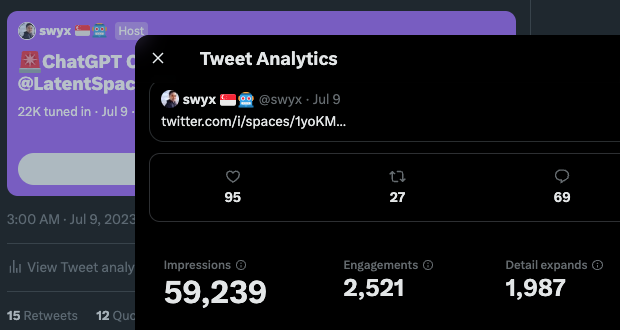Running Developer Twitter Spaces
 swyx
swyxTable of contents

I was recently asked by a founder for my thoughts on running Twitter Spaces. I have mixed feelings about both Twitter and Spaces but they're a useful platform for now. My top space had 22k listeners and most recent one had 2.9k. Listener numbers are just one metric but perhaps I can be helpful to some.
Here's an unordered braindump ( a living list I'll update over time):
Before the Space
The Iron Rule of Content (required): Talk about something people want to hear more about. The topic you choose guides the conversation and a listener's decision to click - if you choose a boring topic nobody cares about then there's very little chance you will get attention. Topics that work:
breaking news
hot industry keywords (e.g. "agents")
hosting debates between rivals
regularly recurring weekly news recap
Schedule the space (recommended): scheduling it ahead of time lets you tweet it out and let people preregister, which drives some social proof (eg this) and lets people (esp guests) set aside time on their calendar to listen. I think scheduling out 1-2 days works best - but this is not a strong opinion.
Invite guests (recommended): you're throwing a party, you should invite people who other people want to party with. Ideally they are credible/authentic to the topic you have picked. You can invite up to 10 people; I think it gets messy beyond 3-4 core" people. The rest of your speakers can definitely join later.
Market the space (optional): tell people what you're talking about, the guests you're having, etc etc. It can be very simple, don't overthink.
Record it (recommended): This is a one-way door decision made when you schedule or create your space. I recommend recording because many of your listeners can actually come from after your Space is done, and you may as well give them the opportunity to catch up. You can also download your Spaces after you're done and publish as a podcast, which is what I do (nice to have to reach people who prefer podcast format over Spaces).
Do a test run if it's your first time (recommended). A lot of people still don't know that you can only speak on a Space using the mobile app, not the web/desktop app. Get used to where all the buttons are and avoid noob mistakes like hitting the "mute all" button by accident, and know simple things like how to pull people up on stage whether by invite or accepting their request, or pinning tweets to the space jumbotron or monitoring the space comments.
Start the space early (optional). Say about 3-5 mins early, so that you have critical mass to just start on time. Turn on the waiting room music until you're ready to start
Sound quality (required): very important. Go into a quiet room. Wifi vs mobile doesn't seem like a critical issue but some people have bad wifi and should check that. I have tested airpods vs plugged in headphones, and neither were as good as just having your phone on speaker. Its awkward and annoying, I just go into a phone booth when I do it. I have not yet tested having a dedicated mic plugged in which should in theory do better.
Planning the agenda (optional): if you have a roadmap for the first 30-60 mins of the conversation, your listeners and your guests will follow along much better. Just say it repeatedly - first we talk about X, then Y, then Z (Q&A is implied at the end). And people will mostly follow suit (or you can interrupt them based on the rules you set)
During the Space
Keep the conversation flowing, dead air is bad. Recap what people said (remember new people are joining all the time), introduce guests (or prompt them to introduce themselves), repeat the agenda you are intending to follow. You start talking the most at the beginning, and then gradually step back to be moderator as your guests fill in with their thoughts (or you ask provoking questions to your panel)
Look for hands raised and let them know when its their turn to speak. I like warming up the N+1 speaker ("ok first X will go, then Y you're next") as well so that they don't leave dead air and know when they'll be asked to speak so they can prepare.
Universal law of good audio: if someone is passionate about something, or if someone is funny, LET THEM KEEP GOING. ask followups, laugh, etc.
If someone is rambling or being overly self promotional or just has bad audio, feel free to cut them off and drop them from the stage. You aren't being rude, you are respecting your audience while they are not.
Co-hosts can help manage the in/outflow of speakers, while you focus on the actual topic and conversation flow. Make sure your cohosts know what kind of speakers you're looking for, sometimes its annoying when a cohost adds a speaker you know is a bad speaker, and you have to kick them.
Try to keep it to a max of 2 hrs. 30-60mins is best. People appreciate when you know how to end it well instead of constantly asking for "any other questions?"
After the Space
thank your guests
(optional) download and publish your recording as podcast
Like with anything in the content business, it has to compound over time. Organizing 1 good space is not as valuable as being known as someone who organizes good spaces consistently.
Any other tips you'd add?
Subscribe to my newsletter
Read articles from swyx directly inside your inbox. Subscribe to the newsletter, and don't miss out.
Written by

swyx
swyx
Writer & Curator, DX.Tips